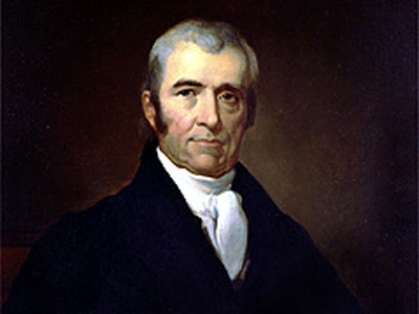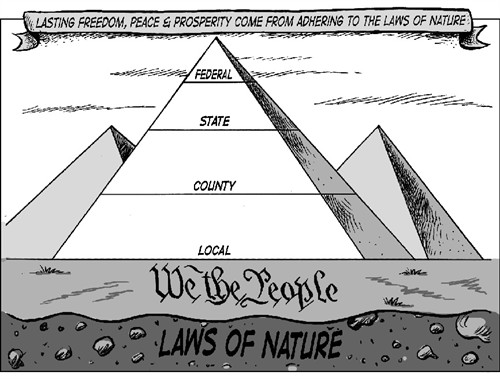
The nation's founders concocted a flawed system of 'federalism' which they left to men like Chief Justice John Marshall to turn into the workable framework for national government.
Federalism is the power sharing
arrangement between the federal government, state governments, and
Indian tribes, that was set up by the Founding Fathers and built
into the U.S. Constitution. click here for more
As this cartoon demonstrates, when the founders of the
United States conceived of federalism, their great 'mistake of
omission' was in leaving out a clearly defined place and role for
the sovereign governments of the five hundred Indian nations on the
North American continent.
Unfortunately, the Founders did a poor job of specifying just how
this tri-lateral arrangement was going to work. Figuring out
how it would work was a task that was left to the
courts. Chief Justice John Marshall took up that
problem in his far-reaching opinions in three Indian cases in the
1820s and 1830s:Johnson v. McIntosh, Cherokee v. Georgia, and
Worcester v. Georgia.
State's rights
advocates have been jealous of native legal standing and the
tribes' special trust relationship with the federal government
since the founding the nation. In fact, it was a battle
over states' rights in the south, over the sovereignty of Cherokee
Indians living inside the state of Georgia, that brought the
nation to its first constitutional crisis in the 1820s. That
crisis resolved itself in the Removal Acts, championed by states'
rights advocates that included the new president, Andrew
Jackson. The Removal Acts, however, proved to be a temporary
fix. Ultimately, the ideological conflict that dogged the
Founders at the Constitutional Convention in Philadelphia, in 1787,
would lead to a Civil War in which the rights of Indian tribes gave
way to the virulent conflict over the issue of slavery.
It is one of American history's great ironies that its original
champion of 'life, liberty, and the pursuit of happiness,' Thomas
Jefferson, was also a staunch states rights advocate whose
ideological descendants in the South would seek to establish as
separate government built on the principle that not all men are
created equal.
Related People
Related Events
Related Flashpoints
Related Places